Iran sees over 30% drop in rainfall as drought worsens
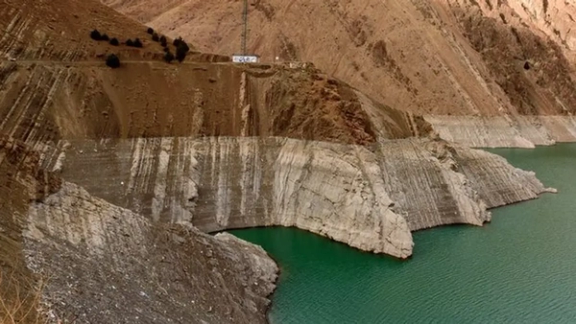
Rainfall across 29 Iranian provinces has dropped by nearly a third since October, according to the Iran Meteorological Organization, as the country continues to struggle with water scarcity.

Rainfall across 29 Iranian provinces has dropped by nearly a third since October, according to the Iran Meteorological Organization, as the country continues to struggle with water scarcity.
The country has experienced an overall rainfall reduction of 31.9% during this period, with the southern provinces of Sistan-Baluchestan and Hormozgan seeing the most dramatic declines at nearly 90% and just over three-quarters, respectively.
Mansour Shishehforoush, the Director General of Crisis Management for Isfahan Province, highlighted the severity of the situation earlier this year.
"Isfahan has a dry and semi-dry climate, and over 80% of its area is experiencing drought conditions," he said in July, noting that water tankers were being used to supply over 300 villages. Isfahan has since recorded a 68% reduction in autumn rainfall.
Despite the alarming trends, some regions have bucked the pattern. South Khorasan and Mazandaran have reported slight increases in rainfall, rising by 1.1% and 14.3%, respectively. These exceptions provide little relief, as other provinces, including Golestan and Gilan in the north, have experienced reductions of 16.6% and 7.8%, exacerbating the broader drought.
Sadegh Ziaeian, head of the National Center for Weather Forecasting and Crisis Management, flagged an additional concern: reduced water inflow into the Caspian Sea from neighboring countries, contributing to a decline in the sea's water level.
The rainfall deficit follows a year of weather extremes, including heavy flooding earlier in central and southeastern regions. These floods caused extensive damage, destroying homes and severing transport routes, highlighting the volatility of Iran's climate and the challenges it poses for crisis management.
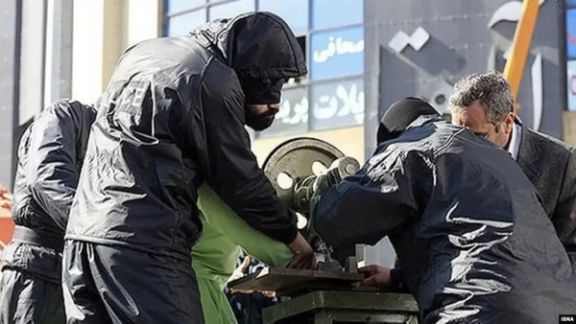
Iran has carried out an unprecedented number of amputations for theft over the past three years, a punishment based on Islamic law that breaks international human rights laws.
"If theft is proven under the conditions set by Islam, the thief's fingers must be amputated," said Gholamhossein Mohseni Ejei, the judiciary chief, during a speech at Tehran’s Islamic Azad University on Saturday.
"This is a ruling from God that has been implemented and continues to be implemented, despite the pressure we face from various organizations. The majority of hadd punishments [fixed punishments prescribed under Islamic law] for theft carried out in the past three years have been this ruling."
Hand amputation sentences became a formalized aspect of the Islamic Republic's judicial system following the 1979 revolution. Since then, Iran has long faced criticism for its enforcement of amputations and other corporal punishments which are banned under international law.
Reports suggest that authorities have tried to limit publicity around these punishments in recent years due to international pressure. Despite this, numerous cases have been documented.
On October 13, the state-affiliated Iran daily newspaper reported that eight theft suspects had been indicted and referred to Tehran's Criminal Court, facing potential amputation sentences.
Another case, reported on October 29, saw the amputation of four fingers from two brothers in Urmia prison after they were convicted of theft.
On November 9, Tehran based Etemad reported that two suspects accused of robbing safety deposit boxes at the National Bank were sentenced to hand amputations.
At least 237 individuals in Iran were sentenced to amputation between 1 January 2000 and 24 September 2020, with at least 129 of those sentences carried out, according to Ravina Shamdasani, spokesperson for the UN Human Rights Office.
Shamdasani called on Iran to halt such punishments and comply with its international human rights obligations, urging an end to corporal punishment, including amputations, flogging, and stoning.
Amputation sentences contravene international human rights standards, including the International Covenant on Civil and Political Rights, which Iran has signed. This treaty explicitly prohibits inhumane or degrading punishments. Human rights advocates argue that these practices violate the principle of human dignity, a cornerstone of international law.
"Iran has carried out amputations for years, and the actual numbers are much higher than what is reported in media outlets like Etemad newspaper, as most cases are not officially announced," Mahmood Amiry Moghadam, director of the Oslo-based rights group, Iran Human Rights, told Iran International.
"This is an inhumane, cruel, and degrading punishment. It is not only in violation of ethical and human principles but also illegal under international laws. It constitutes a serious violation of the conventions that the Islamic Republic of Iran has signed and pledged to uphold. These practices are far from acceptable."
Iran remains one of the few countries in the world to enforce corporal punishments, including amputations for theft and other crimes. The country has not signed the UN Convention Against Torture, despite facing repeated calls from human rights organizations to abolish such practices.
Sentences like flogging, amputations, and even stoning continue to be carried out, underscoring the Islamic Republic's defiance of international human rights standards.
Since 2022, its rights abuses, including the killing of hundreds of protesters by state security forces and often violent crackdowns on women and girls to comply with Islamic dress codes, have seen further sanctions imposed on the country from nations including the US, UK and EU.
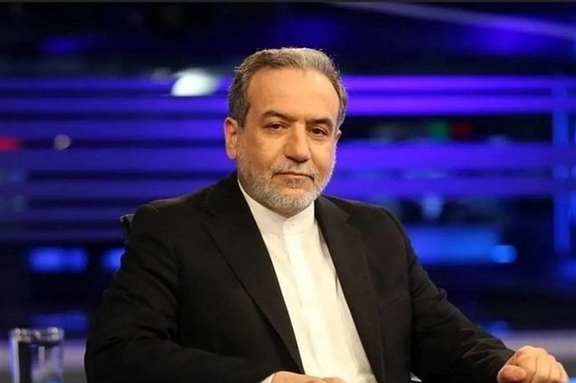
Iranian Foreign Minister Abbas Araghchi spoke of Iran's surprise at the sudden fall of the Syrian government in the face of insurgents during a televised interview on Sunday night.
"The rapid withdrawal of the army was unexpected. All information had been shared in advance. The Syrian army failed to resist, which was largely psychological—no one believed it would happen," he said.
Araghchi said that joint Iranian intelligence had thoroughly assessed the situation, Iran sharing warnings about opposition movements in Idlib with the Syrian government. However, he stopped short of explaining why Iranian forces, a key Assad ally, did not intervene to counter the rapid developments.
“What was surprising was, first, the Syrian army's inability to confront the situation, and second, the rapid pace of developments,” he added.
Araghchi said that while Tehran had a role in the 2017 Astana process - an initiative to build dialogue with opposition groups co-chaired with Russia and Turkey - direct military intervention was not part of Iran’s responsibilities in spite of the country having helped prop up the Assad government for over a decade.
The foreign minister acknowledged Assad’s own shock, saying, “Even Bashar al-Assad himself was surprised by the performance of his army. It was evident there was no accurate analysis within Syria.”

Araghchi also addressed Iran's frustration with recent developments undermining the Astana agreements. “One of the objectives of Astana was to help the government and opposition engage in dialogue. While we made slow progress in this direction, it did not proceed well because Assad’s government showed little flexibility,” he said, in a rare criticism of the decades-long president.
On Saturday, Araghchi participated in the Astana Meeting in Doha, where he met with the Emir of Qatar and other Arab officials.
For now, the situation remains unclear as to Iran's future role in the country, Iran's Supreme Leader set to address the issue in a speech on Wednesday. Ahmad Naderi, a member of the Iranian parliament, said: “Iran's future approach towards Syria depends on the behavior of those who have taken power in the country.”
European Union foreign policy chief Kaja Kallas called the rapid fall of the Syrian government a sign of the weakening of both Moscow and Tehran, while US Secretary of State Antony Blinken linked the collapse to Assad’s refusal to engage politically.
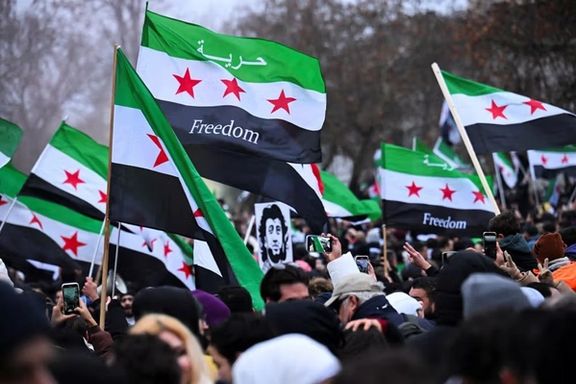
With the fall of the Assad government threatening Iran's key strategic foothold in the Levant, Tehran signals an interest in forging ties with Syria's new power holders, according to an Iranian official.
Long-time President Bashar al Assad fled the country at the weekend, leaving a vacuum in the country after both Iran and Russia had since 2011’s civil war, supported.
Reuters reported that talks had begun in an attempt to "prevent a hostile trajectory" between the countries after a rapid takeover saw the 50-year Assad family rule collapse in days.
The senior official told Reuters that Iran's clerical rulers, facing the loss of an important ally in Damascus and the return of Donald Trump to the white House in January, were open to engaging with Syria's new leaders.
Iran had multiple military bases across Syria, having controlled airports and sea ports which have been a key smuggling route to Iran’s military allies in the region, including its largest, Hezbollah in Lebanon. It is not clear if there is an Iranian presence left in Assad's traditional bastion, the Alawite coastal regions.
Syria was also a location for Iran’s oil sales amid global sanctions, allowing the Islamic Republic to circumvent the crippling economic grip imposed by the US and other nations.
"This engagement is key to stabilize ties and avoiding further regional tensions," the official said.
The fall of the Assad government came after the unification of multiple Sunni militia forces, led by Hay'at Tahrir al Sham, a former al Qaeda ally.
However, it is led by Muhammad al Jolani who, though a Sunni, is known to share Iran's hatred of Israel. His grandfather was displaced to Syria from the now Israeli occupied Golan Heights in 1967.
In a rare Western media interview in 2021 with PBS Frontline, he said he was radicalized by the second intifada in 2000, one of the bloodiest periods in the Palestine-Israel conflict.
Just like Iran's backing of Gaza-based Hamas, the alliance would not be the first time Iran had aligned with Sunni militants in a bid to erase its archenemy, Israel.
“I was 17 or 18 years old at the time, and I started thinking about how I could fulfil my duties, defending a people who are oppressed by occupiers and invaders,” he said at the time.
It is not only Iran which is worried about the new transition, in spite of the global relief of the fall of a man known as a brutal dictator, and whose rule saw the deaths of at least 300,000 civilians, including hundreds in a chemical weapons attack in 2013.
The US carried out dozens of targeted airstrikes on ISIS members and facilities as fears of a resurgence of extremism remained a priority.
“There should be no doubt – we will not allow ISIS to reconstitute and take advantage of the current situation in Syria,” CENTCOM Commander General Michael Erik Kurilla said in a statement.
“All organizations in Syria should know that we will hold them accountable if they partner with or support ISIS in any way.”
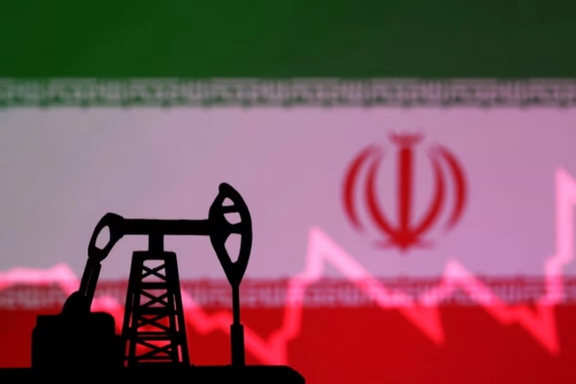
In the wake of the collapse of Bashar al-Assad’s government in Syria, an Iranian tanker carrying oil to Syria has reversed its course in the Red Sea apparently headed back toward the Persian Gulf.
Initially set to deliver approximately 750,000 barrels of Iranian crude to Syria, the Suezmax tanker LOTUS (IMO 9203784) is now returning to Iran, as reported by Tanker Trackers.
Iran has been providing Assad's government with free oil, as well as financial and military assistance throughout the country's civil war. According to Iranian politicians, the Assad government owed Iran between $30-50 billion.
This follows anticipated fuel shortages in Syria, likely to worsen with the fall of Iran's allied government and the takeover by insurgent groups, who stormed the Iranian embassy in Damascus on Sunday.
According to data received by Iran International from Kepler, a leading provider of technology-led insights into energy and shipping markets, Iran has been sending between 60,000 and 70,000 barrels of oil to Syria daily.
Anti-Assad rebels view Iran as a supporter of a regime that suppressed protests and targeted opponents with all available military means during the 13-year civil war. Assad's fall and the withdrawal of Iranian forces would disrupt Tehran's ability to use Syria as a strategic transit route for transferring weapons to the Lebanese Hezbollah and as a military base.
Syria served as a critical corridor for the Islamic Republic, linking Tehran to the Mediterranean in what was often referred to as Tehran's "Shiite Crescent." With Assad's fall, Iran's regional influence is expected to weaken further, particularly following significant Israeli blows against Hezbollah.
“This will probably embolden the Trump Administration to take a tough stance against Iran, in particular by constraining their oil exports. Inflicting economic pain on the regime would seem more likely to yield results now that the Iranians have seen their investment in Syria prove wasted,” wrote Forbes on Sunday.
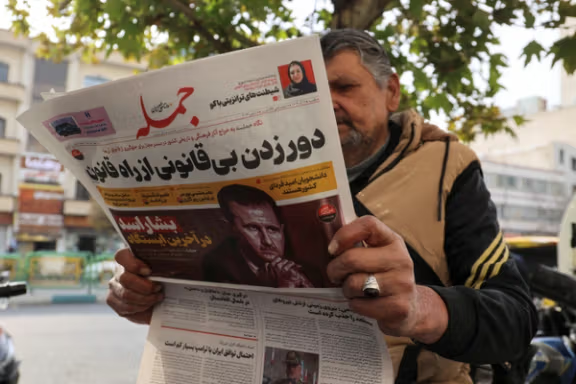
The fall of Syrian President Bashar al-Assad has deprived the Islamic Republic of a key partner, weakening its influence abroad and tearing away a fear barrier which could inspire Iranians to rise against their own rulers.
Iran’s outpost in Syria has collapsed, Chris Doyle, director of the Council for Arab-British Understanding told Iran International, upending Iran's military strategy abroad so thoroughly that it may inspire opponents at home to oust the 45-year-old Islamic Republic.
“The Iranians have taken a huge hit here,” he told Iran International. “It’s certainly ripped up that important [smuggling] corridor it relied on, from Iran to the Mediterranean. Syria now will be a country not in Iran’s control. Iran will lose a lot of assets they’ve invested in, properties they took over won’t remain Iranian.”
He said that as a result of the rapid fall of Syria in less than a week, after being in the hands of the Assad family for five decades, it could also bode well for a full overthrow of the government in Iran, which has been growing ever weaker since the uprising of 2022.
“It will be inspiring many people across the region to see what Syria has done and that will be unnerving for the Iranian regime,” not least, with the weakening of Iran-backed allies Hezbollah in Lebanon and Hamas in Gaza, leaving Iran’s archenemy Israel now in a much stronger position.
“The borders of Syria are certainly not in the hands of the Assad regime now," he dais and highlighted that Kurds control the borders with Iraq. "If Iran wanted to smuggle weapons and fighters into Syria, the Iraqi border is very important. Iran will be reassessing its strategies here and with a Trump administration coming, who knows. It faces some stark choices."
Arash Azizi, a visiting fellow at Boston University’s Pardee Center for the Study of the Longer-Range Future, said he agrees.
"The fall of Assad is the most important blow the Iranian regime has suffered in years," he told Iran International. "It signals the collapse of its 'Axis of Resistance' [military allies across the region] which has been the mainstay of Khamenei’s policy during most of his decades-long term as Supreme Leader," he added.
Iran has for decades supported groups in countries including Yemen, Palestine, Lebanon and Syria.
"Khamenei already had problems saving face given the massive blows the Axis received in the last year but this leaves him further humiliated and isolated," he said, referring to the blows dealt to Iran's largest proxy Hezbollah in Lebanon, and Hamas in Gaza.
After the Hamas invasion of October 7 last year, Israel has been engaged in its longest ever conflict with the Iran-backed group, while Hezbollah on Israel's northern border attacked on a second front, with others from Yemen, Iraq, Syria and the West Bank.
Israel has killed huge swathes of Hezbollah's leadership, including long-time leader Hassan Nasrallah, and according to the Israeli military, taken it back decades. In Gaza, Hamas has also been dealt a huge blow, with the majority of its battalions and infrastructure across the strip destroyed.
Internally, it will also hurt Tehran, said Azizi, in addition to the risks it now faces from the incoming Trump presidency, who has vowed a "maximum pressure" approach to Iran and its allies.
"The fall of Assad shows the weakness of the Iranian regime and will be definitely a boost for the regime’s opponents. It will inspire them to take it on especially as the regime is hemmed in from other sides too: the return of Trump to White House will likely bring renewed pressure on it and Israel is also strengthened," he explained.
"But it will also have effects on the regime’s internal composition. Those factions who seek a deal with the West and want Iran to step back from some of its aggressive policies will see a boost. They will try to get a deal with Trump at any price that might get them some respite."
However, Azizi argued the opposition to the Islamic Republic must become better organized to capitalize on the changing landscape for the impact to be truly felt at home.
"The Iranian opposition could have used this as an excellent opportunity to act against the regime but it’s extremely disorganized and thus not able to," he said. "Its hope will rest on spontaneous movements from the Iranian people — which can never be predicted but is always possible."
Ehud Yaari, an Israeli Lafer International Fellow at The Washington Institute, wrote on Sunday that while concerns persist about weapons such as chemical arms, long-range rockets, and surface-to-surface missiles falling into extremist hands, it is “time to celebrate” the downfall of the Assad dynasty, which ruled for over 50 years.
He said the need to reinforce the Druze communities on Israel's northern border is vital, and that is now recognized by the Israeli government.
“The concerns about chemical weapons and heavy missiles falling into the hands of the rebels are certainly justified, but let us remember that there is a huge distance between seizing chemical materials and the ability and, of course, the desire to use them,” he wrote in his column for Channel 12.
“The rebel leaders already announced this morning that they are ready to help international organizations dismantle the chemical weapons that Assad has accumulated and announced that in any case they have no intention of using them."